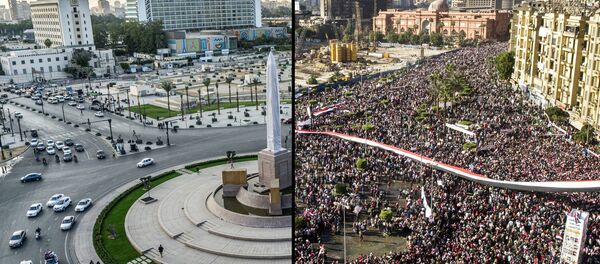Mounir Mahmoud, a tour guide from Cairo was in the city of Luxor, guiding a group of Israeli tourists, when he heard the news that mass protests had erupted in the capital.
Once his group boarded the last El Al plane that took them back to Israel, and he delved into what was going on, he soon realised that Egypt was standing right at the gates of a new era -- that of change.
Piling Frustration
But it didn't catch him by surprise, and Mounir says that "the writing was on the wall" even before the 25 January revolution.
"We all felt it because there was a general feeling of frustration with the situation and with the corruption that was associated with the rule of [then president] Hosni Mubarak."
It took years to bring the Egyptian public to that level of frustration. During the first decade of his rule, Mubarak did invest in rebuilding Egypt's economy and aimed at positioning it as a leader of the Arab world. But Mounir, just like many other Egyptians, felt that the former president was more concerned with "securing the stability of his regime" that focusing on curing the country's domestic problems.
The living standards of Egyptians had gone down significantly since the 1990s. Up to 30 percent of Egypt's population lived below the poverty line, many lived on the streets and in cemeteries, unable to afford a proper flat. Meanwhile, the top echelon continued to get richer, something that widened the socio-economic gap and added to the dissatisfaction of the masses.
On the political front, Egyptians also felt despair. Mubarak distributed power as he pleased. Freedom of press was restricted, news outlets were not allowed to criticise the president and his family. He undermined political institutions and curbed the opposition.
"At some point we felt Mubarak was working to transition his power to his son Gamal and we wanted to prevent that from happening."
Longing for Change
When the revolution erupted, Mounir would take to the streets together with hundreds of thousands of other Egyptians, demanding that the longtime president relinquish power.
Once he did in February 2011, Egyptians were hopeful that the much awaited change would finally come, but soon enough they realised that their revolution was hijacked by the Muslim Brotherhood (MB) movement, that used the momentum to come to power.
After ascending to power, they didn't solve the country's many problems. Instead, they failed to address deepening poverty, ignored social exclusion, discriminated against women and minorities and continued with the policy of favouritism, giving out key positions to Muslim Brotherhood loyalists.
"Morsi's rule was not what we had hoped for," explained Mounir. "And this is the reason why Egyptians, me included, started to stage protests to topple that regime."
That revolution of 2013 was different from what Egypt saw two years earlier. It featured not only the younger generation that was scared of the route the country was taking under the Brotherhood but also the elderly, women and minorities, who were all united behind the same goal -- the ouster of then-president Mohammed Morsi from power.
No Regrets
That, however, did not take long, and shortly after the coup, the military re-established its control over Egypt and Mounir says that he has "no regrets".
Shortly after he assumed office, Egypt's new president Abdel Fattah Al-Sisi started a war against the Muslim Brotherhood and their allies that he considered terrorist and dealt a severe blow to militants, who found a safe haven in the difficult-to-reach areas of the Sinai peninsula.
The economic situation also started improving. The Egyptian pound grew stronger against the dollar, unemployment went down to ten percent from the previous 12 and the government started investing billions of dollars into infrastructure, construction of new residential areas and various profitable projects like the new Suez canal and the development of gas fields.
"It is safe to say that now we are reaping the fruits of the two revolutions. I think everyone is happy with the level of security Egypt currently has. We are lucky that our country was not turned into another Iraq, Libya or Syria. On the economic front, things are moving slowly but at least they are moving, so in general the Egyptian public is satisfied with Sisi's reforms."
Statistics backs Mounir's claims. In 2016, just two years after he assumed office, more than 90 percent of Egyptians said they were satisfied with the rule of Al-Sisi.
And in 2018 that satisfaction led to his re-election for a second term, a post that he will hold until 2030.
"Only now we finally started to enjoy from a better standard of living. Of course all our expectations haven't been fulfilled yet but we will wait patiently, simply because we know that the neglect that has been here for decades cannot be eradicated that quickly."





